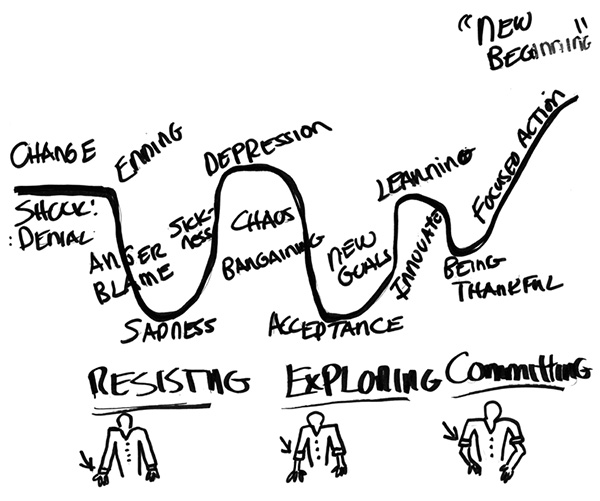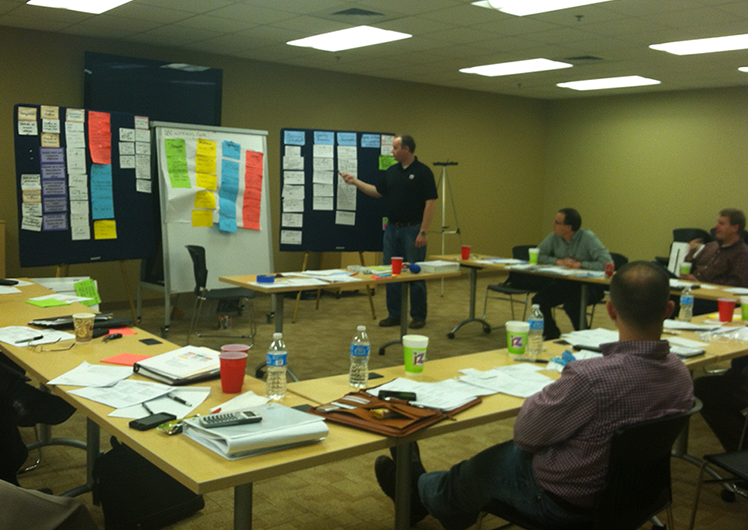Roll Up Your Sleeves – Living & Leading in a World of Constant Change, Part 6
Last week we reviewed these 5 concepts: Last week we reviewed these 5 concepts:
One Unshakable Truth – Everyone has unseen battles they are fighting. Be kind.
#1 Change is not the same as transition.
#2 Personality matters.
#3 Role clarity counts.
#4 Principles set the pace.
#5 Purpose is power.
Process matters. Show people a simple model so they can identify where they are in their transition process and progress. Listen and guide them with questions to take ownership of their next step.

As shown here, in each phase there are things people say or do that help you identify which stages someone may currently be experiencing. Ideally, people move progressively from Resisting to Exploring to Committing but people do get stuck in a phase or waffle back and forth. With a little practice, you can learn to identify where people are and help them move forward one step at a time by asking some simple questions and listening attentively.
For example, let’s say you’re a manager after a restructuring has occurred. It has not been long since the layoff. You recognize behavior that indicates a worker seems to still be depressed – displaying Resisting behavior. Your goal would be to help him/her move forward one step to the next phase – Exploring.
To do this, you might ask these type of questions in the order of Past > Present > Future • How do you feel about what happened?
• What do you think about the way this was handled?
• How could this have been done differently?
• What would you like to see happen now?
• What would be a good next step to take to improve our team/department?
• If you see anything we could do better, I’d love to hear your ideas.
Broad Jumping
“Perfect. Perfect. Wouldn’t change a thing. Everybody should just stop whining and get back to work. I think it’s great- I haven’t missed a lick. You keep asking these questions, I’m really too busy to talk.” When you hear this kind of responses to our questions above, this person has done the Promised Land broad jump, like in the summer Olympic games. Their game is pretending to instantaneously leap over all of the emotions people normally go through and act as if their world never changed. I have found that if a person does not acknowledge any feelings along the way in transition, those feelings will show up in a very negative fashion one day – oftentimes in passive aggressive ways or condescending visceral responses. If this happens, just know they are hurting and be patient and remember everyone has unseen battles they are fighting- be kind.
Have a Seat
Whether a person is moving smoothly through the transition phases or broad jumping, it is still your role as a leader to do your part to guide them (not push or direct them) to find their own new beginning. In Roll Up Your Sleeves, Darrius, the master mentor, teaches the four young men a key leadership principle. He says, “Great leaders are great listeners.” Most of us have two challenges when it comes to listening: finding the time and really listening. Since we really can’t find time because it is continually moving, we have to schedule time. Carving out time to talk with people during constant change takes a lot of effort, but fortunately talking doesn’t have to take a lot of time to be effective, if you just have a seat.
An article published in The Journal of Patient Education and Counseling reported about this concept in a controlled study with 120 adult post-operative inpatients admitted for elective spine surgery. The article said that patients commonly perceive that a provider (physician) has spent more time at their bedside when the provider sits rather than stands. Patients perceived the provider as present at their bedside longer when she/he sat, even though the actual time the physician spent at the bedside did not change significantly whether sitting or standing. This study provides empirical evidence for this perception. https://doi.org/10.1016/j.pec.2011.05.024
Journal Entry: Famous humorist, Ashleigh Brilliant, said, “If you think communication challenge for everyone. As problem solvers with extreme time pressures, we tend to focus on “fixing things.” People’s emotions impacted by rapid change cannot be fixed or managed. People usually just need encouragement and attention to heal on their own. As a leader, your goal is to create an atmosphere where that healing can begin. Who do you need to have a seat with- in your leadership and life?
Quotes worth noting:
“It is wiser to find out than to suppose.” Mark Twain
“The biggest communication problem is we do not listen to understand.We listen to reply.” ― Stephen R. Covey
“See, I am doing a new thing! Now it springs up; do you not perceive it? I am making a way in the wilderness and streams in the wasteland.” The book of Isaiah 43:19- The Bible



